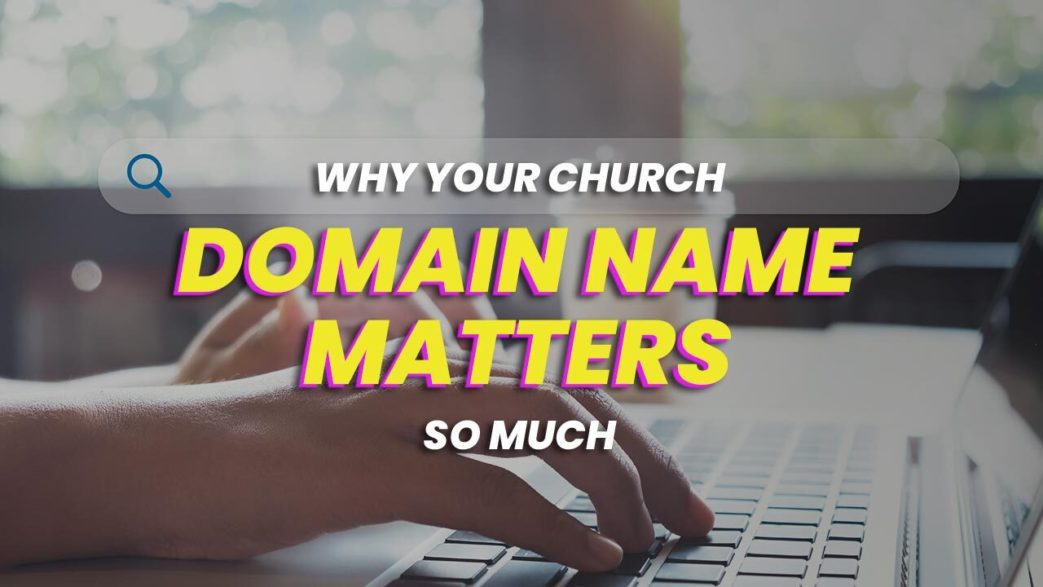Your church has a physical address. And it’s an integral part of your ministry’s identity since it’s how your community finds you. When you think about it, that address represents the real estate that your congregation occupies.
Now think about your website. The church domain name is much like your church’s physical address. The domain name is the real estate your church occupies online. And like the address on your building, your domain name is how online browsers find you.
Since more people engage online and are less likely to stumble through your church doors, your church website and domain name matter more today than ever before.
There are complex layers of consideration that go into choosing the right domain name for your ministry. It goes beyond just “seeing what’s available” and running with it.
We’ll explore everything you need to know about choosing the best online representation of your church and all the other church domain name tips that go along with it.

Table of contents
- Who Owns Domain Names, Anyway?
- What Does Your Welcome Mat Say?
- The Shorter the Church Domain Name, the Better
- Does Your Church Domain Name Have Meaning?
- Other Church Domain Name Extensions Are Ok These Days
- Should You Secure More than One Church Domain Name?
- Avoid Increased Risk of User Error & Typos
- Threads Are Better Than Static Phrases
- Try to Include Keywords in Your Church Domain Name
- Does Your Church Domain Name Look Awfully Similar to Another?
- How Will Your Domain Extend to Other Platforms?
- How to Handle Name Changes vs. Traditional Recognition
- Choosing a Descriptive Name
- How Does Your Community Refer to Your Church?
- What About Dot-Church Domains?
- How to Know If Your Church Domain Name Is Working in Your Favor?
- Check Your Church Name Domain Analytics
- Familiarize Yourself with Your Domain Authority
- Where to Go to Browse & Secure Available Domain Names
- What If the Church Domain Name You Want Is Taken?
- Where to Begin When It’s Time to Change
- More Related To Your Church Domain Name
Who Owns Domain Names, Anyway?
Let’s introduce the world of internet domains. No one owns online domain names or the millions of variations thereof. However, the Internet Corporate for Assigned Names & Numbers, a non-profit, oversees the general assignment of domain names and IP addresses.
When someone officially purchases a particular domain name, he or she doesn’t actually own it. The public deals with domain name registrars to essentially rent website domains. Anytime a domain name owner stops paying the minor fee for annual use, the designation goes back into the general roster of available names for others to select.
What Does Your Welcome Mat Say?
Take a look at your church’s current domain name. Now imagine you’re a local resident hearing that domain name and seeing it for the first time. Do you feel welcomed?
Take the time to evaluate your current URL and ask around to get feedback from others within your faith community. A church domain name, much like the name of your church itself, should inspire a feeling of welcome, fellowship, and support.
If your domain name doesn’t generate an emotional response, your online welcome mat might not be as welcoming as you’d like.
The Shorter the Church Domain Name, the Better
Some church names are long only because they represent geographic regions with long names. But when it comes to online domains, the best advice is to run with the shorter versions of your church name.
If your church name is Harvest Community Bible & Fellowship Church (we made this up, by the way,) you don’t want to be harvestcommunitybibleandfellowshipchurch.com. That just represents too many opportunities for spelling errors. And let’s be honest. Who’s going to enjoy typing a name that long into a browser or search engine.
Instead, Harvest dot something or Harvest Bible dot something would be a better church domain name. It’s an easy-to-remember name to search for, easy to spell, and relatable. And shorter names are easier on those browsing with mobile devices on the go, too.
Does Your Church Domain Name Have Meaning?
We often talk about the importance of telling your church and mission story in every online engagement. It’s your brand story that will resonate and connect with an audience in the most authentic way.
Now consider your church domain name. Does it support your story and represent the meaning behind your church vision?
Here’s an example. Assume your domain name is mainstreetbible.com, and it made sense because you’re physically located on Main Street. But if your actual church name is different, or if your brand now represents something more significant than “Main Street,” your church domain name isn’t supporting your story and meaning.
Other Church Domain Name Extensions Are Ok These Days
It used to be that the only relevant domain extensions were dot-coms. And if you can secure a dot-com, it’s best to do so. But since everyone is on the web these days, those dot-com variations have run short on options, forcing the acceptance of other domain extensions like dot-org and dot-net.
According to a recently shared study, more than 40% of the 330 million domain names presently in use are dot-coms. Obviously, getting a short URL or even the name you want might be difficult as a result of this fact. But don’t be afraid to explore other extensions if it means keeping your first-choice domain name intact.
Should You Secure More than One Church Domain Name?
Yes, it’s absolutely ok and often encouraged to secure more than one church domain name if it makes sense to do so. You just don’t want to have them both actively indexing with Google. This means you should use one primary name for your site and redirect or forward any other variations to that primary site domain.
Avoid Increased Risk of User Error & Typos
It’s quite possible that if your domain contains any rare or unusual words, people will mistype it or not know how to properly spell it. In this scenario, it’s a good idea to get the names that cover the most common misspellings of your name so you can immediately forward visitors who make a typo when entering your URL to your true site.
Threads Are Better Than Static Phrases
Threads, or short statements, make for great domain names. Even if your church name is ABC Church of Christ, consider checking into threads that might also make sense for your mission. For example, if you have a faith tagline or ministry promise as part of your church brand, there could be a domain name variation available.
Try to Include Keywords in Your Church Domain Name
When selecting the best church domain name for your ministry, it’s also best to try and incorporate one of your strongest SEO keywords. When people search online, Google will rank sites better if those keywords are present within the domain.
You can use other keyword tools like Google Keyword Planner or Keywordtool.io to help explore the strongest keywords that align with your church.
Does Your Church Domain Name Look Awfully Similar to Another?
If a competitor or other business entity establishes a similar-sounding domain name and website, your potential churchgoers may be drawn away from your site inadvertently. Consider acquiring “copycats” of your church domain name and redirect them to your main domain to avoid this.
How Will Your Domain Extend to Other Platforms?
Of course, choosing the best-fit domain name for your ministry is driven by online visibility with Google and search engines. But you’ll also be marketing on other platforms, including social media. Before officially selecting your church domain name, check to see if variations of that name are also available on your other channels to keep things consistent and simple.
You can sample Knowem.com as a great tool for searching online domains across a variety of segments.
How to Handle Name Changes vs. Traditional Recognition
If your church has rebranded or had a different name in the past, it’s a good idea to acquire the old name as well as the new one so that everyone can find you. Alternatively, if you wish to change your ministry’s name, purchase, and host the website on the new domain address, and configure the old domain address to forward to the new one.
Choosing a Descriptive Name
Your brand or website may be referred to in numerous ways by others and not exclusively via its definitive name. You might want to register a domain name that describes your church as well as the church name, like Fellowship Church as well as Fellowship Church of Anytown USA.
Again, lead with and index only one pillar site name and point any others to it as a forward or redirect.
How Does Your Community Refer to Your Church?
Your church has an official name. But maybe your community refers to your church as “the big red church” or knows your building by another name. So don’t be afraid to scoop up those other variations or terms of endearment as redirecting domains.
When people search for “the big red church” in Anytown, USA, they’ll still be able to find you.
As an example, if you Google wallyworld.com, the first site to appear in the results is Wal-Mart. Because so many commonly refer to the retail giant as “Wally World,” Wal-Mart looks to be found when browsers keyword search the slang version.
What About Dot-Church Domains?
As a church, you can even explore other great church-based domain name designation options, including dot-Church and dot-Bible, to support even better recognition of your brand.
If you don’t have those variations of your current domain name secured, you should do so and redirect them, at the very least.
How to Know If Your Church Domain Name Is Working in Your Favor?
If your church domain name isn’t great, you won’t necessarily see signs right away. Not seeing web traffic might be a result of other factors as well as a poor domain name, for example.
But if anyone has mentioned difficulty finding your church website online, you might want to revisit your domain name. If there are duplicate letters, hyphens, or your name is hard to spell, it could be people are having trouble getting their typing fingers in order.

Check Your Church Name Domain Analytics
You can check your domain name’s health by reviewing the Google Analytics associated with your church domain. Your primary site name and any others you’ve secured and forwarded will log traffic statistics in GA.
To check your supporting domains and analyze cross-domain tracking, you can:
- Verify that all domains are officially validated under the same property.
- Check the source domain in the “referral exclusion” list in your Google Analytics.
- See if the “allow” linker in GTM is set to a “true” setting.
- Verify that your target domain name has a linker parameter in the URL.
Familiarize Yourself with Your Domain Authority
Another metric to monitor is your church domain authority. This data will provide insights on how likely your website is to rank for precise keywords. It’s an SEO authority metric that can help you determine the health of your domain’s traffic.
Where to Go to Browse & Secure Available Domain Names
Anyone can buy an available domain name. Typically, you can visit a domain name registrar online, choose a name, and pay a fee. The costs may vary. But at the low end, registering a church domain name might only cost between $10 and $100 annually.
Forbes suggests these to be a few of the top domain registrars to browse first:
- GoDaddy
- NameCheap
- Bluehost
- Google Domains
- Domain.com
- Hover
- Dreamhost
What If the Church Domain Name You Want Is Taken?
If in your quest to secure a new church domain name you find the moniker you want is already taken, what then? In those instances, you might be better served by seeking out your second choice for a name.
Alternatively, you can potentially connect with the owner of the domain name you want and try to buy it from them.
- Check to see what the domain name is currently being used for to make sure it wouldn’t negatively impact your brand.
- Determine your budget to purchase before negotiating.
- Explore via the domain registrar to see who owns the name you want.
- Contact the current domain name owner and attempt to negotiate a purchase.
There is a market out there of individuals who buy up various domain names to then wait to be contacted by potential buyers in hopes of a big payday. This negotiation process could take time and be costly. Buyer beware.
Where to Begin When It’s Time to Change
If you want to explore ways to strengthen or rebrand your church domain name, you don’t have to go it alone. Get the professional guidance with the ministry-related experience you need by partnering with ReachRight!
ReachRight can help you assess the effectiveness of your current domain name and develop a plan to improve your digital welcome mat. Contact us to make sure your church domain name is putting your ministry’s best foot forward!




